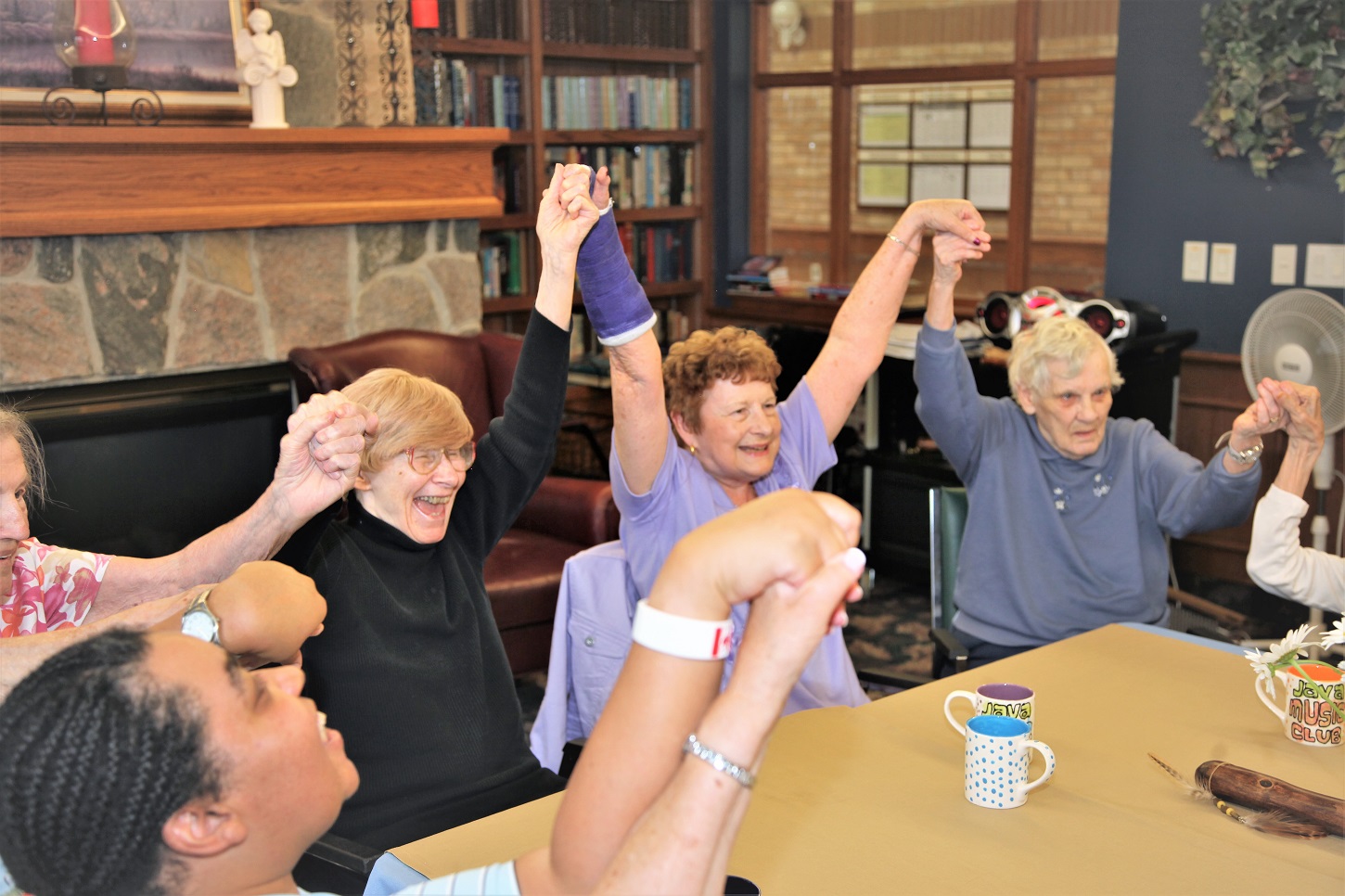Essential Connections

Subscribe to Catalyst
Subscribe to get our magazine delivered right to your inbox
Related Articles
Subscribe to Catalyst
Subscribe to get our magazine delivered right to your inbox
Share This Catalyst
Related Articles
When older adults make the move into care homes, it becomes essential to forge new bonds. Finding ways through loneliness and isolation with music.
Evidence that strong interpersonal connections are essential to our mental and physical health is growing. And these ties may be more important as we age, particularly among older adults living in retirement residences and long-term care homes. According to Dr. Kristine Theurer, who’s been a researcher in the long-term care sector for more than two decades, “We all yearn to connect with others, and for many people, moving into a residence means seeing friends and family less frequently. So it’s crucial for them to make new connections.”
The harmful effects of social isolation and loneliness on mental and physical health are well known. Several studies have found that isolation increases the risk of cardiovascular disease, obesity, anxiety, and depression and that loneliness can lead to depression, alcoholism, and suicidal thoughts.
During the pandemic, public health measures such as masks, physical distancing, and size limits on gatherings have added to social isolation and loneliness. In retirement and long-term care homes, in‑person visits with family members and volunteers were banned for months, and residents only interacted with staff wearing protective masks, face shields, and gowns.
While these conditions pushed isolation to the limit for these residents, growing public concern was at least able to bring more attention to the issue and give Theurer a chance raise awareness about fostering human connections. A 2015 article she was the lead author on in the Journal of Aging Studies article had already documented the value of standardized peer support and peer mentoring. “The Need for a Social Revolution in Residential Care” argued for an overhaul of programming in retirement residences and long-term care by incorporating activities that advanced residents’ social identities, encouraged reciprocal relationships, and increased social interaction. The goal of that vision was to transform the model of resident care into one of resident engagement — a state that covers basic needs but also allows people to thrive and be enriched.
“Many homes focus on light group activities, such as games and crafts, without recognizing that the crucial benefits actually come from meaningful interactions between peers,” Theurer said. “The focus needs to be on building those meaningful connections.” —
She began harnessing the power of peer support groups and peer mentoring to foster meaningful interactions in 2011, after founding Java Group Programs. The efficacy of the organization’s three research-based programs — Java Music Club, Java Memory Care, and Java Mentorship — has since been demonstrated in a series of studies. Today, hundreds of retirement residences and long-term care homes across North America have implemented them. The most popular is Java Music Club, a peer support activity that focuses on interaction and altruism.
Laura Forsyth, regional manager of life enrichment for Chartwell, a company that runs more than 200 residences across four provinces, has seen its effectiveness firsthand: “For our residents, Java Music is magical,” she said. “I regularly see residents who don’t know one another bond and connect through the program.” After we implemented it in 2014, “Java Music has been so successful that it has influenced Chartwell’s corporate culture. We now emphasize meaningful interpersonal connections in nearly everything we do.”
While preventing social isolation and loneliness might sound easy, it isn’t — especially for older adults struggling to adapt to life in a retirement residence or long-term care home. Most residences and homes don’t offer programming that fosters meaningful connections.
“We still have much to learn about the mental health and well-being of people living in long-term care and how to optimize their quality of life,” said Danielle Sinden, who is the director of the Centre of Excellence in Frailty-Informed Care. Part of Perley Health, which serves a community of more than 600 seniors in long-term care and independent-living apartments, the centre conducts and shares the practical research needed to improve care.
Several of its research projects focus on the mental health and wellness of older adults. One pairs up residents living with Alzheimer’s disease with university students and tracks the results over many visits. Another promotes social connection, emotional health, and meaning in life through an online peer support group. The centre is also evaluating Java Music among a group of residents in long-term care.
“I think there’s something about being a passive recipient of care that fosters loneliness and depression,” said Theurer. “Helping others is a pathway to joy and meaning. Properly designed group programs provide opportunities for people to help their peers. And that makes us feel good.”
Informal caregivers who are concerned about the mental well-being of loved ones can find other strategies to help build connections in the Caring for Older Adults During COVID-19 tip sheet from the Mental Health Commission of Canada and in ongoing research into other aspects of caring for older adults.